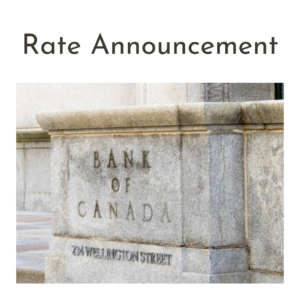| Bottom Line
The implications of today’s Bank of Canada action are considerable for the housing market. The prime rate will now quickly rise to 5.45%, increasing the variable mortgage interest rate another 75 bps, which will likely take the qualifying rate to roughly 7%.
Fixed mortgage rates, tied to the 5-year government of Canada bond yield, will also rise, but not nearly as much. The 5-year yield has reversed some of its immediate post-announcement spike and remains at about 3.27% (see charts below). Expectations of an economic slowdown have muted the impact of higher short-term interest rates on longer-term bond yields. This inversion of the yield curve is consistent with the expectation of a mild recession next year. It is noteworthy that the Bank omitted the usual comment on a soft landing in the economy in today’s press release. Bank economists realize that the price paid for inflation control might well be at least a mild recession.
Another implication of today’s policy rate hike is the prospect of fixed-payment variable-rate mortgages taken at the meagre yields of 2021 and 2022, hitting their trigger rate. There is a good deal of uncertainty around how many these will be, as the terms vary from loan to loan, but it is another factor that will overhang the economy in the next year.
We maintain the view that the economy will slow considerably in the second half of this year and through much of 2023. The Bank of Canada will hold the target policy rate at its ultimate high point– at least one or two hikes away– through much of 2023, if not beyond. A return to 2% inflation will not occur until at least 2024, and (as Governor Macklem says) the Bank’s job is not finished until then. |

